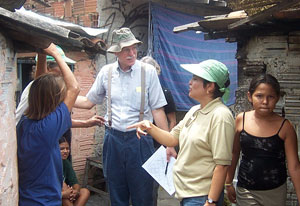Alzheimer's gene protects cognition in Brazilian slums
January / February 2014 | Volume 13, Issue 1

Photo by Francis Dobbs/World Bank
Fogarty has a long history of
supporting capacity building
research in Brazil, including a
study on a gene that protects
children's brains from diarrhea-
induced harm.
By Cathy Kristiansen
One of Fogarty's long-supported capacity building successes comes from a partnership that has generated research expertise, training and scientific findings in Fortaleza, an impoverished area of northeastern Brazil. The collaboration between the University of Virginia (UVA) and Federal University of Ceará began more than 30 years ago and flourished, bringing insight to improve health in Fortaleza's shantytowns and elsewhere.
One project, for example, led to the astonishing discovery that the "Alzheimer gene," or APOE4 allele, much maligned for its association with dementia in older age, can provide some benefit. The research was supported by Fogarty's brain disorders program, with additional funding by NIH's National Institute of Child Health and Human Development (NICHD), and led by UVA's Dr. Richard Guerrant with UVA child psychologist, Dr. Peter Patrick.
The idea for this investigation was sparked by an earlier NIH study showing a link in children between frequent enteric infections and lower cognitive ability - particularly in tests for semantic fluency, such as naming as many different fruits in a minute as possible. Curious that these functions are similarly compromised in Alzheimer's patients, Guerrant decided to investigate whether lowest-scoring children carried APOE4.
His international team, led in Brazil by Dr. Aldo Lima with Dr. Reinaldo Oriá, studied 72 Fortaleza children who had been under active surveillance since birth and lived in an environment of heavy enteric infection. The researchers obtained saliva samples for genotyping and collected data on diarrheal history, then conducted tests of verbal fluency, coding aptitude and ability to solve maze puzzles.
Surprising everyone, the children who had APOE4 alleles tested better than those with different alleles, with the gap widest in the highest diarrhea comparison. This suggested that somehow APOE4 protected, rather than harmed, at-risk children's brains during the critical first two years of life, when neurological development is intense and exposure to diarrhea can be frequent.
"This really is an extraordinary story," said Guerrant. "It is an obvious advantage to have APOE4 at one state in life while a potential disadvantage at a later stage." Although exactly how the allele is protective remains unknown. Researchers in Brazil and the U.S. are testing animal models to investigate the mechanisms involved and the impact of interventions using the amino acids glutamine and arginine, or zinc - an essential nutrient. Guerrant's team is also collaborating to investigate if glutamine speeds repair of the intestine. Guerrant noted, "The link of enteropathy to brain development and function is an area of intense interest right now."
When UVA and the University of Ceará began their partnership, research and related training capacity barely existed in Fortaleza. With grants from NIH, especially Fogarty, and various other partners over the past 30 years, the institutions trained and mentored young scientists as they pursued research on topics highly relevant to low-resource areas of the world. Of particular interest in Fortaleza was how chronic enteric and parasitic infections, common in the shantytowns, impact health throughout life, including by compromising absorption of the nutrients needed for physical and mental growth. Research collaborations have also revealed three new and emerging pathogens causing persistent diarrhea in local children.

Photo courtesy of Dr. Richard Guerrant
Dr. Richard Guerrant works with Brazilian collaborators
to build in-country research capacity.
Today, University of Ceará has four centers of basic science and education and five professional colleges, and is one of the most respected higher learning institutions in Brazil. Many researchers there were trained at UVA and maintain close collaborations on numerous research projects.
Capacity building continues, focusing now on developing more expertise for laboratories, clinical trials and genetic epidemiology, all the while gathering data to inform policy and practice on how to control enteric and parasitic infections and prevent their lasting consequences.
A decade ago, Guerrant began applying the lessons learned in Brazil to his newer collaboration in a rural area of South Africa with similar health problems. "There is no more important global health concern," he said, "than the lasting morbidity of repeated childhood infections leading to malnutrition and impairment of child development."
Fogarty's Brain Disorders in the Developing World: Research across the Lifespan program is designed to increase research capacity in low-resource countries and help improve neurological health for millions around the globe.
More Information
To view Adobe PDF files,
download current, free accessible plug-ins from Adobe's website.